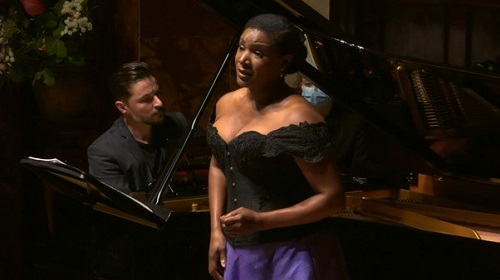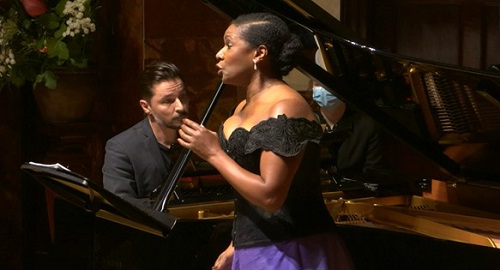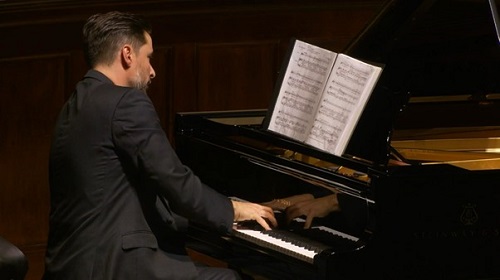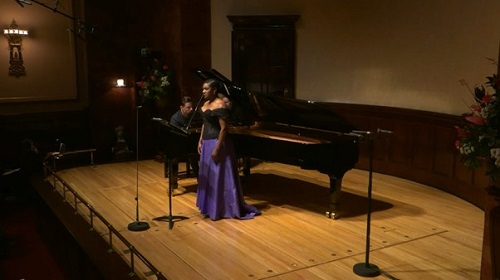One year on from her Wigmore Hall debut, and following the release of her highly praised album of the songs of Samuel Taylor-Coleridge, Heart & Hereafter, soprano Elizabeth Llewellyn returned to Wigmore Street with pianist Simon Lepper to open the Hall’s 2021 season.
Romantic Italy formed the core of Llewellyn’s programme. The tragic dramas and impassioned melodies of Puccini and Verdi have been a staple of the soprano’s operatic career and she knows how to let these songs blossom like arias – realisations of embracing feeling and situation, rather than lieder-like integrations of music and word. Singing with elegance and unmannered but very personal expression, she imbued the vocal lines with glowing colours and shades, the poems’ sentiments borne aloft by the comforting opulence of her soprano.
Both Puccini and Verdi composed around twenty songs. In Puccini’s case, several of them also found alternative form in his works for the stage. ‘Morire?’, which reflects on life and mortality, re-appeared as Ruggero’s Act 1 aria, ‘Parigi è la città dei desideri’, in La Rondine. Llewellyn’s phrasing was graceful and communicative, supported by Lepper’s unobtrusive arpeggiated accompaniment, and the song built compellingly towards the unaccompanied declamation – only those who have crossed the shore into the afterlife can understand death – which forms the impassioned climax. The wind gusted through the poplar trees in the outer stanzas of ‘Terra e mare’, stirring up the voices of the sea, while the subtle rubatos of the central verse conjured the poet-speaker’s dreaminess – as captured, too, by the lovely mezza voce of the close: “Lontana è la voce del mare!”

The familiar strains of Mimì’s Act 3 farewell were heard in ‘Sole e amore’, the light playfulness tinged with a touch of wistfulness. A more profound solemnity imbued ‘Ad una morta’, a plea to a soul in heaven to divulge the pleasures of eternity. Here, Llewellyn conjured the spirit of Puccini’s tragic heroines. The lullaby ‘Sogno d’Or’ was beautifully tender, the melody gently rocked by the piano’s lulling motions, while the concluding vocal line swept upwards into reverie on a beam of golden light: “Bimbo d’amor, ecco il sogno d’or.” ‘E l’uccellino’ skipped with delicate charm and the sequence closed with ‘Canto d’anime’, Llewellyn’s soprano flowering with shining, uplifting power.
The chosen Puccini songs dated from the late 1880s to the early 1900s; Verdi’s songs were largely composed between 1838-47. ‘Stornello’, in which a faithless lover is reminded that they too can be betrayed, was conversational and engaging. Llewellyn’s characterisation was beguiling, and she articulated the witty text crisply and expressively. In contrast, she and Lepper brought febrile intensity and tragic tension to ‘Perduta ho la pace’, a lament worthy of Violetta – something which could also be said of ‘Ad una stella’, in which the poet-speaker’s reflections on heavenly spheres rippled with passionate sensibility. ‘La zingara’ was a bright and breezy, and delightful, bolero.

Llewellyn and Lepper framed the Italian songs with music by twentieth-century English composers. Thomas Hardy’s Collected Poems would surely have been Gerald Finzi’s desert island book of choice. Indeed, when the composer Robin Milford was isolated on Guernsey during World War II, Gerald Finzi wrote to his friend, ‘if I had to be cut off from everything that would be the one book I should choose’. In all, Finzi composed more than fifty songs based on Hardy’s verse, and of incomplete sketches and fragments there are as many again. In 1949, seven years before his death, Finzi had written to a friend that there were more than one hundred poems by Hardy to which he was attracted, but that he suspected he would go to his grave with most unset. The seven songs of Till Earth Outwears were gathered posthumously, in 1958, and set texts that explore Hardy’s perennial themes – the futility of life, nature’s serene indifference to mankind, the transfiguring power of memory. It is difficult not to see songs such as ‘Life Laughs Onward and ‘It Never Looks Like Summer Here’, written during the composer’s terminal illness, as reflecting Finzi’s own understanding of life’s finiteness.
From the opening bars of the first song, ‘Let me enjoy the Earth’, it was clear that Llewellyn and Lepper appreciated how to let the flow of the words unfold through Finzi’s gently billowing melodies and the natural roll of the piano’s contrapuntal voices. Her soprano clean and light now, Llewellyn was faithful to the fastidious precision of Finzi’s text setting, communicating with a relaxed artlessness that did not preclude shadows and pathos. In the first song there was sadness but not sentimentality, and passion too, as from afar the poet-speaker shared in the joy of others’ rapture, even though Paradise, “contain[s] no place for me”. The sparse piano conclusion conveyed quiet resignation, and a similar barrenness infused ‘In Years defaced’ which presents a characteristic Hardyan locale: a place infused with love, memory and loss. Lepper’s thoughtful accompaniment evoked both the absence of a love now dissolved by the passing years and the ‘gust and gale’ that prevails in the present. Yet, the sweetness of the vocal line offered consolation: Llewellyn’s subtle elongation made us hear the “faery sound” that “lonely shepherd souls” catch amid the knolls. Finally, a magical pianissimo, “On not again/ Till Earth outwears/ Shall love like theirs /Suffuse this glen!”, was a gleam of transfigured rapture.

Some of the songs are brief vignettes which succinctly capture the poetic sentiment. The duo communicated the innocent happiness of ‘The Market Girl’, the simple folky narrative of which deftly draws the listener into the tale of unexpected love – a tale which ended here with glowing blissfulness. ‘It never looks like summer’ seems simple on the page but the poem contains some interesting juxtapositions that emphasise the discordance of vision between Hardy and his loved one, and between the past and the present: “It never looks”, “she saw”, “its look”, “it seemed to me”. The care and meticulous of the performance ensured that we appreciated the import of the contradictory visions, but the voice’s hopeful, energetic rise, “Summer it seemed to me”, rang out with glowing conviction, momentarily overcoming the irreconcilabilities of the past. The piano’s hesitancy introduced a darker hue in the second stanza, though, as hope gave way to a helplessness which was emphasised by the pointed isolation of the final phrase, “or elsewhere!”, and the harmonic inconclusiveness of the piano’s final cadence.
Finzi’s choices of text are sometimes surprising. ‘At a lunar Eclipse’, in form and content, is not obviously ripe for song setting, but Llewellyn shaped the barless declamatory lines effectively, the eternal implacability of the cosmos conveyed by the piano’s steady chordal progression and lightly moving bass octaves. The closing song, ‘Life laughs Onwards’, was more affirmative, offering continuity as well as loss. There was casual ease in the flowing counterpoint and chiming swing of the piano’s introductory phrases and Llewellyn was responsive to the small textual details: the opposition of guileness and darker presentiments, “Daisies throve gaily there,/ As though/No grave were under”; the blitheness of the gambolling children. There was an emotional force as the poet-speaker declared, “I saw that Old succumbed to Young”, and the soprano’s hushed, unaccompanied “’Twas well” did not quite console. These Finzi songs made for a wonderfully assured opening to the recital, drawing the listener into the poems’ intimacies and struggles. I very much hope that Llewellyn returns to Finzi’s Hardy settings in future.

The recital ended with William Walton’s six-song cycle A Song for the Lord Mayor’s table, which was commissioned for the 1962 City of London Festival. The title song was jubilant and buoyant, the vision of Londoners living in the Promised Land, wallowing in milk and honey, resounding exuberantly. The Thames flowed silky, languid and deep in ‘Glide, gently’, mesmerisingly silvery and smooth. Molly’s protestations of faithfulness to the doubting Tom, in ‘Wapping Old Stairs’, were coloured with a mischievous hint of disingenuity; ‘The Contrast’, which juxtaposes urban bustle with rural sleepiness, was vividly characterised and agilely performed. Finally, the bells of St Clement’s pealed out in ‘Gay go up and gay go down’, fittingly marking the beginning of this new Wigmore Hall season with celebratory excitement.
The performers generously gave the Wigmore Hall audience two lovely encores, dipping first into their Samuel Taylor-Coleridge album for the composer’s 1930s-style ‘Life and Day’, and then turning to Taylor-Coleridge’s own teacher Charles Villiers Stanford – and to the first song that Llewellyn learned as a rookie music student – to bring the recital to a gentle close with ‘A Soft Day’.
This concert is available free of charge in HD video on the Wigmore Hall website and social channels.
Claire Seymour
Elizabeth Llewellyn (soprano), Simon Lepper (piano)
Finzi – Till Earth Outwears Op.19a; Puccini – ‘Morire?’, ‘Terra e mare’, ‘Sole e amore’, ‘Ad una morta
Sogno d’Or’, ‘E l’uccellino’, ‘Canto d’anime’; Verdi – ‘Stornello’, ‘Perduta ho la pace’, ‘Ad una stella’, ‘La zingara’; Walton –A Song for the Lord Mayor’s table.
Wigmore Hall, London; Friday 3rd September 2021 (live stream).